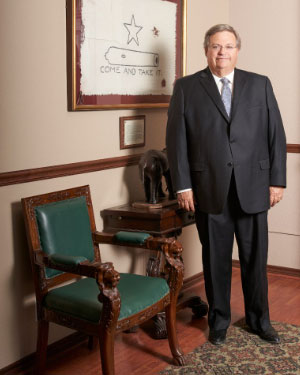Clyde Moody Siebman (1958-2021)
Born November 26, 1958, in Sherman, Texas, Clyde Moody Siebman spent his early years in the nearby town of Pottsboro. His family then moved to Plano, Texas, for his father’s employment before Clyde graduated from Plano Senior High School in 1977. He attended Southern Methodist University (SMU), where he earned a dual undergraduate degree in Business Administration and Psychology in 3 1/2 years and then a Juris Doctor in 1984 on a full scholarship. He earned many distinctions during college and law school, including a Departmental Distinction in Psychology for his work to address mental competency and the law.
Clyde’s 35-year legal career earned him the well-deserved recognition of being one of the top lawyers in the state of Texas. He was dedicated to the rule of law through the preservation of the 7th Amendment to the United States Constitution and its guarantee of trial by jury. Board Certified in Civil Trial Law by the Texas Board of Legal Specialization, Clyde was included in the annual Texas Super Lawyers list published by Thomson Reuters legal division in Texas Monthly magazine since the list debuted in 2003. He maintained an “AV” Peer Reviewed ranking (very high to exemplary) by Martindale-Hubbell for over two decades, and he earned selection to The Best Lawyers in America based on his expertise in Patent, Trademark, Copyright, and Commercial Litigation. Clyde was named the 2018 Lawyer of the Year for Patent Litigation and 2020 Lawyer of the Year for Copyright Litigation in Dallas-Fort Worth in The Best Lawyers in America.
Clyde began his federal practice serving as a law clerk to the late United States District Judge Paul Brown. He traveled throughout the district alongside Judge Brown while serving the Sherman, Texarkana, and Beaumont Divisions of the Eastern District of Texas. Clyde appeared as counsel in more than 500 Eastern District of Texas cases. In addition to maintaining a robust state court practice throughout his career, he regularly represented clients in the Northern and Western Districts of Texas and before the Federal Circuit and 5th U.S. Circuit Court of Appeals.
Clyde was a frequent lecturer on various legal topics, and he regularly participated in prominent programs and initiatives. He served as Founding President of the Eastern District of Texas Bar Association and the Judge Paul Brown Inn of Court. He also was heavily involved in the New York Intellectual Property Law Association, the Sedona Conference, and the Leahy Institute of Advanced Patent Studies. He was also a member of the delegation of attorneys and judges that presented the first patent mock trial at Beijing University in China in 2012, where he delivered a presentation on U.S. trial practices at Southwestern University School of Law and Political Science in Chongqing, China. Clyde served as the current Chairman of the Bench Bar Conference of the Eastern District of Texas and as Chairman of the Advisory Committee for the Institute for Law and Technology of the Center for American and International Law in Plano (formerly Southwestern Legal Foundation).
As he did in the legal arena, Clyde made a profound impact in public affairs. He was a Texas Elector in 2000, serving as a member of the Presidential Electoral College in one of the closest presidential races in American history. Clyde also served by way of Gubernatorial appointment as Chairman of the Grayson County Regional Mobility Authority, Commissioner of the Red River Interstate Compact Commission, Member of the Board of Directors for the Red River Authority of Texas, and as Commissioner of the Red River Boundary Commission, where he played a key role in resolving the long-time boundary dispute between Texas and Oklahoma. Clyde also holds the unique distinction of being named as Conservator of the Riverbend Water Resources District by the 82nd Texas Legislature, helping settle a decades-long legal battle over water issues in East Texas and Southwest Arkansas. Serving as Grayson County Republican Chairman for more than ten years and on the State Republican Executive Committee, Clyde played a pivotal role in the transition of both Grayson County and the state of Texas from Democrat to Republican-held majorities. Though a life-long conservative, Clyde was also respected for working across the political aisle when it served the public interest.


